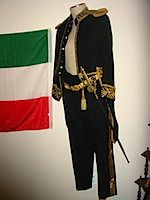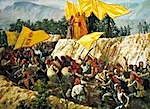By PAUL PARDI [Philosophy News] – Do philosophers sacrifice something if they not only analyze and teach but proscribe and declare? One may argue that the complexities of life demand that philosophers go beyond mere analysis to clear declarations of how that analysis ought to be applied. And doing so will inevitably keep the discipline relevant to more people—at the very least, it will keep people talking. But it also could be argued that it is precisely because life is complex that a deep analysis of some issue should provide the foundation for pragmatics and not include practical proscriptions. Philosophers provide the critical foundation for politics but should leave the politicizing to the scores of individuals that are closest to the situations that politics affects.
Continue reading “Noted: From polemic to philosophy – and back.” »
By CHRISTOPHER CALDWELL [New Criterion] – In one of the odder passages in his memoir, Hitch-22, the prolific Anglo-American journalist Christopher Hitchens defines a meaningful life as one that includes “friendship, love, irony, humor, parenthood, literature, and music, and the chance to take part in battles for the liberation of others.” This doesn’t add up. Battling for the liberation of others is a vocation for those who are committed, unbending, and (too often) humorless; irony is the mood of the wit, the cynic, the fellow who is putting you on. For four decades, Hitchens has tried both. He writes lapidary, aphoristic, and even hilarious essays on questions that he presents as no laughing matter.
Continue reading “Noted: Hitchens. Hydra.” »
 By TERRY McDONELL [Lapham’s Quarterly] – Among the greatest sports stories ever told, none pulls more sweetly at the heartstrings than the one about the Comeback Kid. The fall from grace followed by the rise to glory. The hero down in the count or left in the dust, making the come-from-behind move at the clubhouse turn, floating it out of the park with two out in the bottom of the ninth. The fan nation wonders where Joe DiMaggio has gone and looks to its greatest athletes to preserve its hope, and time was when they could provide the stuff of dreams and supply sportswriters with grist for the mills of legend.
By TERRY McDONELL [Lapham’s Quarterly] – Among the greatest sports stories ever told, none pulls more sweetly at the heartstrings than the one about the Comeback Kid. The fall from grace followed by the rise to glory. The hero down in the count or left in the dust, making the come-from-behind move at the clubhouse turn, floating it out of the park with two out in the bottom of the ninth. The fan nation wonders where Joe DiMaggio has gone and looks to its greatest athletes to preserve its hope, and time was when they could provide the stuff of dreams and supply sportswriters with grist for the mills of legend.
The sweet story no longer holds true to form. The invincible Tiger Woods takes a leave from golf after multiple infidelities are revealed by at least nine mistresses. He says he is sorry. It’s hard to believe him. He returns to competition without his game, another middle-of-the-pack golfer. Michael Vick, the most exciting player in the NFL in 2006, goes to prison for dogfighting, returns to football without his game, and barely gets off the bench. Pete Rose, the banished “Hit King,” never to be forgiven for betting on baseball, hustles his own autographs in Las Vegas.
Continue reading “Noted: Alex as Odysseus.” »

Room with a view of Sandycove.
By SIMON GOLDHILL [The Times Literary Supplement] – Since James Joyce’s Ulysses made rewriting The Odyssey
made rewriting The Odyssey the foundational gesture of modernism, there have been innumerable rather trivial contemporary engagements with Homer, which, even when they are as engaging as Margaret Atwood’s Penelopiad
the foundational gesture of modernism, there have been innumerable rather trivial contemporary engagements with Homer, which, even when they are as engaging as Margaret Atwood’s Penelopiad , have rarely been more than a one-trick pony. Derek Walcott’s Omeros
, have rarely been more than a one-trick pony. Derek Walcott’s Omeros , in verse, is the outstanding exception. The thought of yet another slim, self-conscious volume of modernist prose, this time a first novel by a Californian computer scientist, whose PhD was on a “computational corpus-based metaphor extraction system”, does not sound promising – although the idea of a system to extract metaphors from texts might be a good modernist joke: a terrifying totalitarian world where metaphor-cleansing was an industrialized process.
, in verse, is the outstanding exception. The thought of yet another slim, self-conscious volume of modernist prose, this time a first novel by a Californian computer scientist, whose PhD was on a “computational corpus-based metaphor extraction system”, does not sound promising – although the idea of a system to extract metaphors from texts might be a good modernist joke: a terrifying totalitarian world where metaphor-cleansing was an industrialized process.
Continue reading “Noted: The wanderer returns, brilliantly arrayed.” »
By BUDD PARR [Age of Sand] – James Joyce wrote to Henrik Ibsen when Joyce was nineteen years old and Ibsen in his seventies and at the end of his career. Joyce had managed to publish a review —his very first formal publication — of Ibsen’s play When We Dead Awaken a year earlier and, to his great surprise, Ibsen responded: “I have read or rather spelled out a review in The Fortnightly Review by Mr James Joyce which is very benevolent and for which I should greatly like to thank the author if only I had sufficient knowledge of the language.” This began a three year correspondence between the two.
Continue reading “Noted: When Joyce's career awakened.” »
By DEREK LOWE [Corante] – The New York Times reminded its readers the other day about something that people in medical research have known for quite some time: the human genome has not exactly turned out to be an open book full of readily usable data about human diseases.
It does make a person cringe to go back and read the press releases and speeches that were made back when the genome was first announced. How about Bill Clinton’s statement that the genome sequence would “revolutionize the diagnosis, prevention and treatment of most, if not all, human diseases”? Or Francis Collins, predicting “a complete transformation in therapeutic medicine”? He’s got about five more years on that one, but I’m not holding my breath.
Continue reading “Noted: De-hyping the human genome.” »
By SIMON BARON-COHEN [Entelechy] – Imagery may be necessary for human imagination. It has been suggested that all the products of the imagination are derived from imagery, following some transformation of the basic imagery. For example, Rutgers’ psychologist Alan Leslie, when he worked in London in the 1980s, proposed that imagination essentially involves three steps: Take what he called a ‘primary’ representation (which, as we have already established, is an image that has truth relations to the outside world). Then make a copy of this primary representation (Leslie calls this copy a ‘second-order’ representation). Finally, one can then introduce some change to this second-order representation, playing with its truth relationships to the outside world without jeopardising the important truth relationships that the original, primary representation needs to preserve. For Leslie, when you use your imagination, you leave your primary representation untouched (for important evolutionary reasons that we will come onto), but once you have a photocopy of this (as it were), you can do pretty much anything you like with it.ii
Let’s make this more concrete. Your eye looks at a fish. Continue reading “Noted: Imagine a woman without her hair.” »
By FRANK McDONALD [The Irish Times] – Bourchier was no ordinary journalist, but a champion of Bulgaria’s cause even after it sided with Germany in the first World War. He was a confidant of King Boris III and the country’s unofficial representative at the peace conference in Paris; it was Boris who consented to the old Portora boy’s wish to be buried at the ancient Rila monastery.
Continue reading “Noted: James Bourchier, the Times' man in a Bulgarian grave.” »
By KRIS BROUGHTON [Big Think] – There is a phenomenon going on out here in the blogosphere called “good information dissemination”, a trait that often distinguishes us lower paid or usually unpaid bloggers from the members of the media who routinely trumpet the thoroughness of their own work. In the progressive political oasis known as DailyKos, there are often experts who show up from time to time to fill the void for those of us who are hungry for knowledge that is specific and precise, when our rich cousins in the mainstream media start to broadcast more recycled misinformation than we can stand.
Continue reading “Noted: The improving qualities of Fishgrease.” »
By JOEL E. COHEN [The American Scholar] – I want to mix apples and oranges by insisting on the important features shared by poetry and applied mathematics. Poetry and applied mathematics both mix apples and oranges by aspiring to combine multiple meanings and beauty using symbols. These symbols point to things outside themselves, and create internal structures that aim for beauty. In addition to meanings conveyed by patterned symbols, poetry and applied mathematics have in common both economy and mystery. A few symbols convey a great deal. The symbols’ full meanings and their effectiveness in creating meanings and beauty remain inexhaustible.
Continue reading “Noted: Modern poetry and practical math.” »
By NATHAN SCHNEIDER [The Nation] – [Sir John] Templeton’s own spirituality was eclectic. Though a lifelong Presbyterian, he imbibed the wisdom of religions both Eastern and Western, ranging from his friend Norman Vincent Peale, the prophet of the organization man, to Ramakrishna. Early on, his mother exposed him to the Unity School of Christianity, a turn-of-the-century movement that emphasized positive thinking and healing through prayer. The Unity School considered itself progressive and even, loosely speaking, scientific: a practical application of Christianity to modern life.
Out of his humble origins in small-town Tennessee, Templeton built a career as one of the great architects of globalization—”the dean of global investing,” Forbes once dubbed him. As he grew older, though, his wealth ever multiplying, Templeton began turning his attention away from business. “All my life I was trying to help people get wealthy, and with a little success. But I never noticed it made them any happier,” he told Charlie Rose in a 1997 interview. “Real wealth is not in money; it’s in spiritual growth.”
Continue reading “Noted: Templeton and anti-religious scientific orthodoxy.” »

Iran, left behind by Mohammad Reza Shah.
By FOUAD AJAMI [The Wall Street Journal] – Three decades ago, before his final flight to exile, the Shah of Iran had drawn a line: He would not fire on his people. He was a king, he said, and not a dictator. The army had not yet cracked; there were loyalists keen to make a stand against the revolutionary upheaval. But the man at the center of the storm had boarded a plane, with his immediate family, in search of a country that would have him.
It’s impossible to fathom such a principled retreat by today’s “Supreme Leader,” Ayatollah Ali Khamenei, and his vast apparatus of repression and terror. If anything, a year after the fraudulent election last June 12, the theocracy is entrenched and the Revolutionary Guards and the Basij, the regime’s murderous paramilitaries, man a political order bereft of mercy and restraint. Iran was not fated to have its “velvet revolution.” The Green movement that challenged the ruling apparatus has not been able to carry the day.
Continue reading “Noted: In Iran, Twitter is no defense.” »
By ALISON FLOOD [The Guardian] – Paula Claire, has withdrawn in protest over what she is describing as “serious flaws” in the election process that she believes have pushed best-known candidate Geoffrey Hill ahead of all other contenders.
Claire, an Oxford-based poet who hoped to “provide a comprehensive update on the hidden mass of innovative 20th-century poetic forms; show how the tradition of group speaking of poetry has been revitalised; and encourage the use of modern technology in the service of poetry” if she were elected, informed Oxford University yesterday that she would no longer be running in the election.
She is protesting over the fact that she was described as a “performer and artist” in Oxford’s announcement of the 11 candidates for the post, omitting the fact that she is a poet.
Continue reading “Noted: Oxford's uncomfortable chair in poetry.” »
By MARGARET WENTE [Toronto Globe & Mail] – Nomad is, in part, a brilliant introduction to the dynamics of Muslim families in the West. It explains how girls are cowed and shamed into submission, and how boys grow up confused. They are easy marks for the propaganda of well-funded jihadists, who offer them a meaning, a purpose, and a sense of identity. Ms. Hirsi Ali has met plenty of these young men and women on university campuses. “They start displaying what I think of as al-Qaeda chatter,” she says. “Israel is the small Satan, and America is the big one. They defend sharia law.”
is, in part, a brilliant introduction to the dynamics of Muslim families in the West. It explains how girls are cowed and shamed into submission, and how boys grow up confused. They are easy marks for the propaganda of well-funded jihadists, who offer them a meaning, a purpose, and a sense of identity. Ms. Hirsi Ali has met plenty of these young men and women on university campuses. “They start displaying what I think of as al-Qaeda chatter,” she says. “Israel is the small Satan, and America is the big one. They defend sharia law.”
Continue reading “Noted: The uninformed morality of 'intellectuals'.” »

Grandfathers of the Red Guard.
By JONATHAN SPENCE [in an interview with Jim Leach in Humanities Magazine] – Mary Wright’s first book was called The Last Stand of Chinese Conservatism. And that gives us, perhaps, a sense of where she was going.
She was interested not just in this group called the Taiping and their revolutionary aspects or in their Christian aspects, which, by the way, some people say were not very deep. Others say it ran extremely deep in the Taiping—they had studied with foreign missionaries, usually fairly informally, and some of the leaders certainly knew the main outlines of Christian doctrine.
But Mary Wright’s main interest was how the state coalesces again after a colossal civil war and an internal rebellion that led to fifteen to twenty million casualties. This enormous loss of life ended in 1864, and the ruling elite was able to reestablish itself for another forty-five years of imperial rule. Was there a valid tradition of Chinese conservative thinking that could be linked from the bureaucracy and the examination system to the practical skills that allowed the ruling elite to reestablish itself after the rebellion?
Continue reading “Noted: A Taiping lesson.” »
























